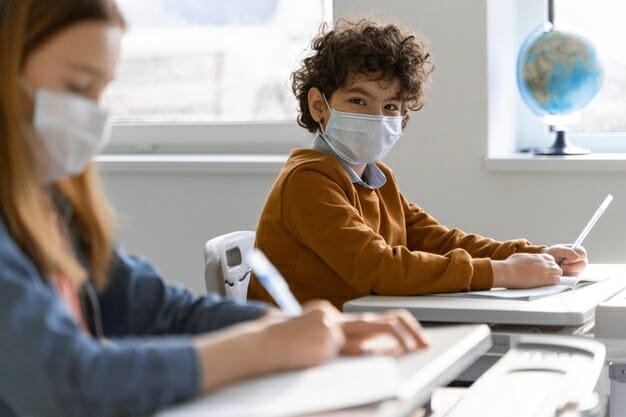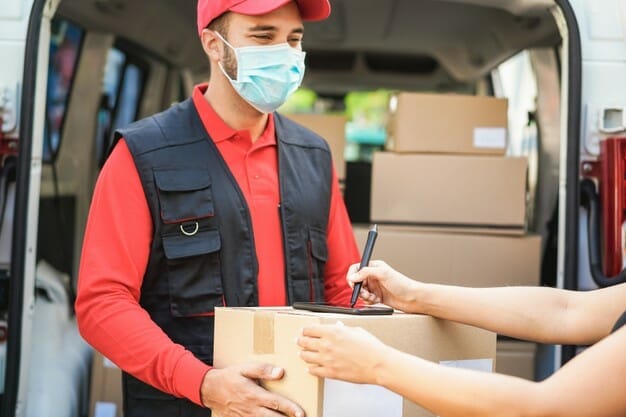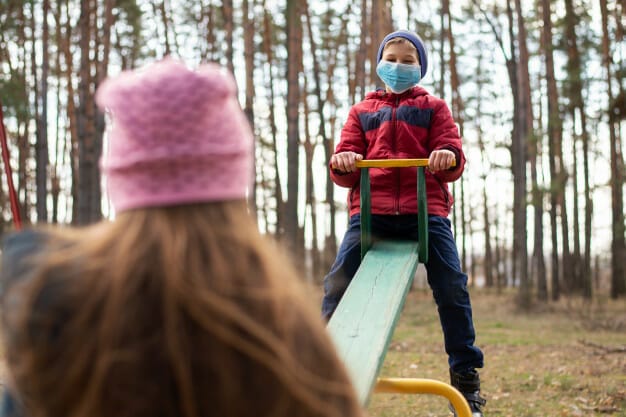Article by: Katharine Moore, Speech Language Clinical Fellow
It is no secret that the Covid-19 Pandemic has put a damper on the way we go about our day to day lives. For each and every one of us, this has been a year of unprecedented times and has forced us to expect the unexpected. Many of us have faced challenges whether it be health related or adjusting to changes we never pictured dealing with. For children, this pandemic might seem unexplainable and confusing. Their fast-paced, busy lives have likely become virtual and for many of them this means time away from school and extra-curricular activities. Just like ours, their sense of normalcy is no longer. Parents across the country may struggle with the idea or ability to send their kids to school or may not have that option.
As a speech therapist working with the pediatric population, I have seen the impact this has had on children’s social interactions. Even as an adult, adjusting to the new social norms since the beginning of the quarantine life hasn’t been easy, so to think of it from a kid’s perspective is difficult to imagine. Over time, the importance of social interactions and cognitive development has become higher and higher on the list of priorities. We see that from a young age, children are absorbing the skills needed to learn to ask for help, clarify their message, and read social cues within their environment. They are later expected to build upon these skills to learn how to appropriately interact in a wide variety of social scenarios and navigate the “real world”. The lessons children learn from day to day social interactions with peers are crucial to their later social development. As therapists and caregivers, we strive to come up with additional ways to help these skills develop, even when socializing as we knew it seems long gone.

While there is no right or wrong way to help children (and ourselves) through these ever-changing times, we want to maximize on the opportunities to expand their growth and development. In terms of social cognition, we must brainstorm additional ways we can focus on providing these opportunities.
As a speech and language pathologist, I believe it is critical to remember that every social interaction, big or small, helps teach these unspoken “rules” to children. So, while our lives may look a lot different than previous years, there are still numerous ways to create these teaching moments. As caregivers, parents, and therapists, we are tasked with explaining new social norms to children. This might include telling kids that while they might’ve once hugged their peers and classmates that this is now a time where physical contact has to be minimal and we need to give them reasoning for this in a way which they will understand. Changes in our social routine are confusing to us, but even more so to children who are still developing these social skills and norms that take years to build upon. Being open to the questions and struggles children are experiencing right now is vital to their growth and understanding.
Often times we refer to kids as “sponges” who absorb behaviors and knowledge from their environments. With that in mind, as role models, we should provide good examples of being flexible and adapting in unexpected times. This can translate to children and provide them with a sense of calmness based on our reactions. Additionally, giving children the space and opportunity to discuss these changes in their life will help them continue to cultivate their developing skills. When children express or acknowledge the longing to be connected with their friends again, it is helpful to give them ways to do so. These can be virtual meet ups with friends or family, outdoor activities as it is safe to do so, or even good old-fashioned pen-pals. As an adult, the pandemic has been challenging for me personally as I thrive off of human connection and interacting with loved ones, just as many children do. Throughout this past year I’ve noticed how interactions big or small can build upon our sense of socialization and how that can drastically affect our moods. We can use this time at home with children to get to know them better and allow them to socialize in a variety of ways with family members, or friends they might not have had as much time with prior to the pandemic.
When we think of providing children with social opportunities, they don’t have to be grand or thought out. It can be as simple as capitalizing on interactions that occur naturally, like run ins with the mail people or interactions at the grocery stores. Children are observant and pick up on so much more than we think. We can encourage them to interact with the people they are able to see still, and to reach out to friends, family and peers in ways we might not have thought of before. All in all, engaging in social groups (whether it be virtually), outdoor activities, online groups revolving around hobbies/ interests can all be utilized to remind our kids how it feels to connect with people and in turn we can continue to further their social development. I have seen how adaptable children are throughout this pandemic and they have proven to be resilient during these challenging times. In fact, they can probably navigate the virtual world easier than many of us at this point!

Remember to allow them to teach us and engage in areas of interest together to give them that social interaction they are longing for and need more than ever. Most of all remember to give credit to yourself for adapting to the day to day challenges and continuing to set an amazing example for our children!
Covid10 #Socialize #pandemic #SLP #speech #socialcognition #executivefunction #KidSense #Family #staysocial #socialization #socialstrategies #speechpathology #occupationaltherapy

